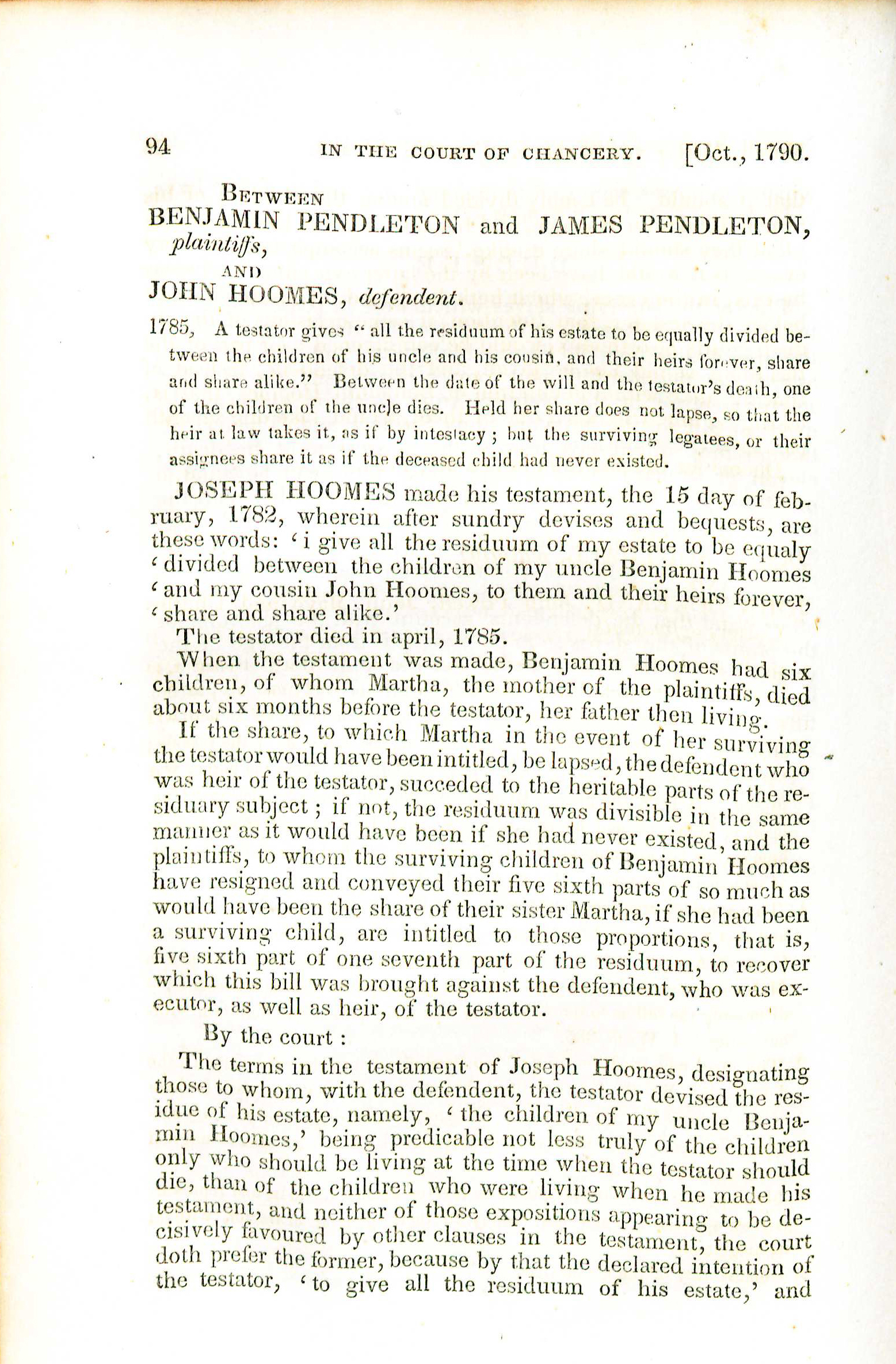Difference between revisions of "Pendleton v. Hoomes"
m |
Mvanwicklin (talk | contribs) m |
||
| (9 intermediate revisions by 4 users not shown) | |||
| Line 1: | Line 1: | ||
{{DISPLAYTITLE:''Pendleton v. Hoomes''}} | {{DISPLAYTITLE:''Pendleton v. Hoomes''}} | ||
| − | ''Pendleton v. Hoomes'', Wythe 94 (1790), | + | [[File:WythePendletonVHoomes1852.jpg|link={{filepath:WytheDecisions1852PendletonVHoomes.pdf}}|thumb|right|300px|First page of the opinion [[Media:WytheDecisions1852PendletonVHoomes.pdf|''Pendleton v. Hoomes'']], in [https://catalog.libraries.wm.edu:443/01COWM_WM:EVERYTHING:01COWM_WM_ALMA51596402710003196 ''Decisions of Cases in Virginia by the High Court of Chancery, with Remarks upon Decrees by the Court of Appeals, Reversing Some of Those Decisions''], by George Wythe. 2nd ed. (Richmond: J. W. Randolph, 1852).]] |
| + | [[Media:WytheDecisions1852PendletonVHoomes.pdf|''Pendleton v. Hoomes'']], Wythe 94 (1790), discussed what happens when one of the heirs assigned a share of an inheritance dies before the will can be executed.<ref>George Wythe, ''[[Decisions of Cases in Virginia by the High Court of Chancery (1852)|Decisions of Cases in Virginia by the High Court of Chancery with Remarks upon Decrees by the Court of Appeals, Reversing Some of Those Decisions]],'' 2nd ed., ed. B.B. Minor (Richmond: J.W. Randolph, 1852), 94.</ref> | ||
__NOTOC__ | __NOTOC__ | ||
| + | ==Background== | ||
| + | In his will, Joseph Hoomes left the remaining part of his estate "to be equaly divided between the children of my uncle Benjamin Hoomes and my cousin John Hoomes ... share and share alike." John Hoomes, the defendant, was Joseph's legal heir (i.e., the person who would inherit property not designated to go to someone else by a will). | ||
| − | + | When Joseph created the will, Benjamin Hoomes had six children. One of these children, Martha, died about six months before Joseph. Benjamin's other five children gave their inheritance rights to the plaintiffs, Benjamin and James Pendleton. | |
| − | + | ||
| + | The Pendletons filed a bill with the High Court of Chancery to claim Martha's share of the inheritance, claiming that Martha's inheritance became invalid when she died. | ||
==The Court's Decision== | ==The Court's Decision== | ||
| − | The High Court of Chancery found that Joseph's language about Benjamin's children referred to children | + | The High Court of Chancery decreed for the Pendletons. |
| + | |||
| + | Wythe found that Joseph's language about Benjamin's children referred to children alive when he died and the will was executed, not the children alive when he wrote the will. | ||
| + | |||
| + | To hold otherwise, Wythe said, would contravene Joseph's intent, since there is a possibility that English law<ref>Wythe's exact words: "if some decisions of the english courts be orthodox". Wythe 95.</ref> would have required all of Martha's share to go to John. In that scenario, the remainder of Joseph's estate would not have been split among Benjamin's children and John, "share and share alike"; rather, John would have received an extra seventh. | ||
==References== | ==References== | ||
| Line 13: | Line 21: | ||
[[Category:Cases]] | [[Category:Cases]] | ||
| + | [[Category:Inheritance]] | ||
Revision as of 10:09, 19 July 2018

Pendleton v. Hoomes, Wythe 94 (1790), discussed what happens when one of the heirs assigned a share of an inheritance dies before the will can be executed.[1]
Background
In his will, Joseph Hoomes left the remaining part of his estate "to be equaly divided between the children of my uncle Benjamin Hoomes and my cousin John Hoomes ... share and share alike." John Hoomes, the defendant, was Joseph's legal heir (i.e., the person who would inherit property not designated to go to someone else by a will).
When Joseph created the will, Benjamin Hoomes had six children. One of these children, Martha, died about six months before Joseph. Benjamin's other five children gave their inheritance rights to the plaintiffs, Benjamin and James Pendleton.
The Pendletons filed a bill with the High Court of Chancery to claim Martha's share of the inheritance, claiming that Martha's inheritance became invalid when she died.
The Court's Decision
The High Court of Chancery decreed for the Pendletons.
Wythe found that Joseph's language about Benjamin's children referred to children alive when he died and the will was executed, not the children alive when he wrote the will.
To hold otherwise, Wythe said, would contravene Joseph's intent, since there is a possibility that English law[2] would have required all of Martha's share to go to John. In that scenario, the remainder of Joseph's estate would not have been split among Benjamin's children and John, "share and share alike"; rather, John would have received an extra seventh.
References
- ↑ George Wythe, Decisions of Cases in Virginia by the High Court of Chancery with Remarks upon Decrees by the Court of Appeals, Reversing Some of Those Decisions, 2nd ed., ed. B.B. Minor (Richmond: J.W. Randolph, 1852), 94.
- ↑ Wythe's exact words: "if some decisions of the english courts be orthodox". Wythe 95.